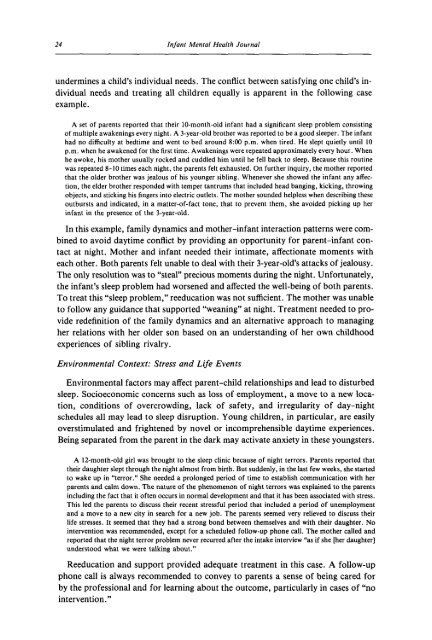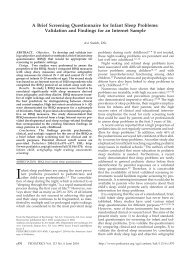Infant Sleep Problems: Origins, Assessment, Interventions.
Infant Sleep Problems: Origins, Assessment, Interventions.
Infant Sleep Problems: Origins, Assessment, Interventions.
You also want an ePaper? Increase the reach of your titles
YUMPU automatically turns print PDFs into web optimized ePapers that Google loves.
24 <strong>Infant</strong> Mental Health Journal<br />
undermines a child’s individual needs. The conflict between satisfying one child’s individual<br />
needs and treating all children equally is apparent in the following case<br />
example.<br />
A set of parents reported that their 10-month-old infant had a significant sleep problem consisting<br />
of multiple awakenings every night. A 3-year-old brother was reported to be a good sleeper. The infant<br />
had no difficulty at bedtime and went to bed around 8:OO p.m. when tired. He slept quietly until 10<br />
p.m. when he awakened for the first time. Awakenings were repeated approximately every hour. When<br />
he awoke, his mother usually rocked and cuddled him until he fell back to sleep. Because this routine<br />
was repeated 8-10 times each night, the parents felt exhausted. On further inquiry, the mother reported<br />
that the older brother was jealous of his younger sibling. Whenever she showed the infant any affection,<br />
the elder brother responded with temper tantrums that included head banging, kicking, throwing<br />
objects, and sticking his fingers into electric outlets. The mother sounded helpless when describing these<br />
outbursts and indicated, in a matter-of-fact tone, that to prevent them, she avoided picking up her<br />
infant in the presence of the 3-year-old.<br />
In this example, family dynamics and mother-infant interaction patterns were combined<br />
to avoid daytime conflict by providing an opportunity for parent-infant contact<br />
at night. Mother and infant needed their intimate, affectionate moments with<br />
each other. Both parents felt unable to deal with their 3-year-old’s attacks of jealousy.<br />
The only resolution was to “steal” precious moments during the night. Unfortunately,<br />
the infant’s sleep problem had worsened and affected the well-being of both parents.<br />
To treat this “sleep problem,” reeducation was not sufficient. The mother was unable<br />
to follow any guidance that supported “weaning” at night. Treatment needed to provide<br />
redefinition of the family dynamics and an alternative approach to managing<br />
her relations with her older son based on an understanding of her own childhood<br />
experiences of sibling rivalry.<br />
Environmental Context: Stress and Life Events<br />
Environmental factors may affect parent-child relationships and lead to disturbed<br />
sleep. Socioeconomic concerns such as loss of employment, a move to a new location,<br />
conditions of overcrowding, lack of safety, and irregularity of day-night<br />
schedules all may lead to sleep disruption. Young children, in particular, are easily<br />
overstimulated and frightened by novel or incomprehensible daytime experiences.<br />
Being separated from the parent in the dark may activate anxiety in these youngsters.<br />
A 12-month-old girl was brought to the sleep clinic because of night terrors. Parents reported that<br />
their daughter slept through the night almost from birth. But suddenly, in the last few weeks, she started<br />
to wake up in “terror.” She needed a prolonged period of time to establish communication with her<br />
parents and calm down. The nature of the phenomenon of night terrors was explained to the parents<br />
including the fact that it often occurs in normal development and that it has been associated with stress.<br />
This led the parents to discuss their recent stressful period that included a period of unemployment<br />
and a move to a new city in search for a new job. The parents seemed very relieved to discuss their<br />
life stresses. It seemed that they had a strong bond between themselves and with their daughter. No<br />
intervention was recommended, except for a scheduled follow-up phone call. The mother called and<br />
reported that the night terror problem never recurred after the intake interview “as if she [her daughter]<br />
understood what we were talking about.”<br />
Reeducation and support provided adequate treatment in this case. A follow-up<br />
phone call is always recommended to convey to parents a sense of being cared for<br />
by the professional and for learning about the outcome, particularly in cases of “no<br />
intervention.”






